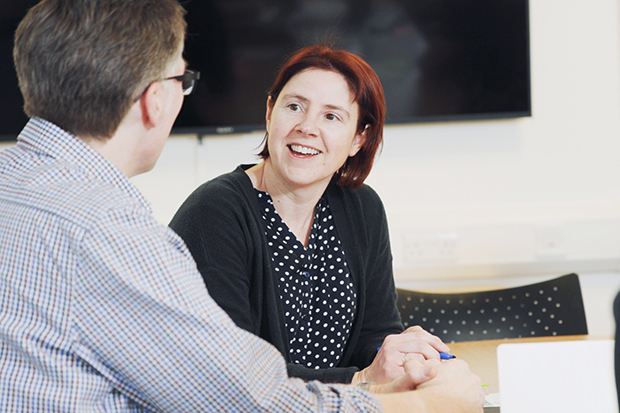My role is to represent the user, so it's vitally important that I understand their needs. Involving as many members of the project team and key stakeholders as possible, from the very beginning of my user research, is the best way for them to learn about our users too.
Together as an organisation, we can then understand how to build and design our services to be as user friendly and as intuitive as possible.
I'm passionate about making sure my research is inclusive. And that I learn about the needs of all the users of the service that's being developed. This includes people with access needs, and those who need support.

So, I designed an accessibility workshop for my colleagues. The objectives for attending the workshop were to:
- gain an overview of what people with different needs experience when using our services
- gain an understanding of accessible and inclusive design
We focus on the needs of our customers, but sometimes it's easy to forget that we have internal customers too. What do I mean by that? I mean my colleagues who use our in-house systems, our intranet and so on.
The workshops
The workshop is interactive, starting with a group exercise that gets everyone on their feet.
Using their smartphone, they're given a task to find information about a company on our 'Search the register' service. Seems simple? How about bouncing a balloon with your other hand? And answering questions about your recent holiday, from the user researchers who are wandering around the room too?
The discussion afterwards revealed that some people found this tricky. This task helped to build empathy with people with diverse needs, especially those with cognitive and dexterity needs.
After that, 4 further mini workshops, with each group of 3 having the chance to take part in all the exercises and tasks. These include watching a video with no sound or subtitles. And a rather peculiar transcript that does not understand a Welsh accent very well.
For another mini workshop, James, our Lead Interaction Designer, has (deliberately) built a terrible website, so we can show how common bad design practices impact users with accessibility needs.
It's important to note here that the goal of these exercises is to give a better understanding of the challenges faced by people with different technology needs.
Analysing the feedback
We've ran 15 sessions so far, for our colleagues in Cardiff, Belfast, Edinburgh and London.
We asked colleagues at the start of each session their reasons for attending. Answers jotted down on post-its revealed words like 'curiousity', 'learn' and 'awareness'.
At the end of the sessions, we asked the group to jot down one word to describe what they thought about accessibility after the session. 'Necessary', 'inclusivity' and 'informative' were just some of the powerful notes that were shared. These were amazing comments to read, making the hard work to design and implement these sessions worthwhile.
We sent everyone a survey afterwards, asking for feedback. We only asked 5 questions, not to take up too much more of their time. The results of the completed surveys informed us that 100% would recommend the course to colleagues.
We've had people leave the session thinking about how they can make excel spreadsheets more accessible, how including subtitles on videos can make a difference, and how using simpler language can make text more understandable.
Next steps
In the coming months, we're planning to open an empathy lab. This will support the next iteration of the workshop which will encourage colleagues to come and have a go with out kit. They'll be able to experience what it's like using different assistive technologies, software and devices when interactive with digital services.
In addition to this, colleagues will be able to log onto a laptop as a specific persona (or profile), which will also help to highlight some of the barriers faced by users.
User research is a team sport
This is a well known phrase within the user research community, particularly those who work within government.
The success of these workshops relies upon the whole user research team helping me.
Accessible design is better design for everyone. We may all see things in our daily work that need addressing and I want everyone to feel empowered to raise concerns when they see them. Sometimes, the smallest changes can make the biggest differences.
Here at Companies House, the user research team are always here to lend a ear if our colleagues want to talk about any issues.
If you're interested in helping us to improve our services, sign up to our user panel.
